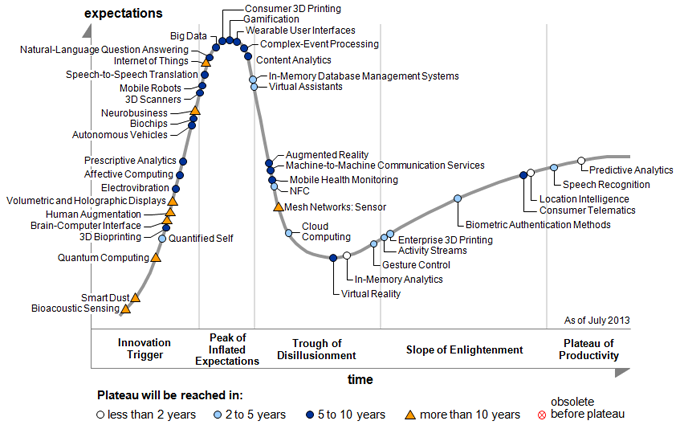April 2009 to September 2011 was my first absent period of tech. In this time I spent most of my time with economics and politics. I want to make up the leeway by reading good articles which I missed back then.
I decided to use hacker news as my source in the hope that most good articles were posted here.
The first thing that surprised me how few concrete tech articles are in the top ones. Most of the stuff are gimmicks or ‘feels’ stories so far. Also a ton of news articles which isn’t surprising. The most surprising fact was that the best articles in my opinion were the mildly popular ones. I read about 1500 headlines, skimmed about 150 articles and these were the most interesting things I found:
This is a beautiful post which shows how important randomization is in cryptography.
Jerry didn’t seem to care. I was confused. I was showing him technology that extracted the maximum value from search traffic, and he didn’t care? I couldn’t tell whether I was explaining it badly, or he was just very poker faced.
n.c.
I remember telling David Filo in late 1998 or early 1999 that Yahoo should buy Google, because I and most of the other programmers in the company were using it instead of Yahoo for search. He told me that it wasn’t worth worrying about. Search was only 6% of our traffic, and we were growing at 10% a month. It wasn’t worth doing better.
n.c.
But they had the most opaque obstacle in the world between them and the truth: money. As long as customers were writing big checks for banner ads, it was hard to take search seriously.
This is a great insight. Some call it the golden cage. You feel so good that you don’t care about possible threats anymore.
That’s why Yahoo as a company has never had a sharply defined identity. The worst consequence of trying to be a media company was that they didn’t take programming seriously enough. Microsoft (back in the day), Google, and Facebook have all had hacker-centric cultures. But Yahoo treated programming as a commodity. At Yahoo, user-facing software was controlled by product managers and designers. The job of programmers was just to take the work of the product managers and designers the final step, by translating it into code.
n.c.
In the software business, you can’t afford not to have a hacker-centric culture.
Your usefulness as a developer is only indirectly related to your ability to code. There are bona fide geniuses working in poverty and obscurity, there are utterly mediocre programmers doing amazingly useful and important work. Github is overflowing with brilliant, painstaking solutions to problems that just don’t matter. Your most important skill as a developer is choosing what to work on. It doesn’t matter how lousy a programmer you are, you can still transform an industry by simple merit of being the first person to seriously write software for it. Don’t spend good years of your life writing the next big social network or yet another bloody blogging engine. Don’t be That Guy.
Perfect.
Nifty trick. It could be especially interesting in combination to longer articles.
Lots of threads about the decline of HN:
I talked with Ward Cunningham once about this – any good community helps you to grow, but after a time you outgrow it. Perhaps they should be like a book – you read them, and then after that you dip into them for a bit, then less often, and eventually you don’t pick them up again.
I experienced that myself quite some times. You just outgrow communities over time. While some are great for beginners you’ll get annoyed after some time not progressing and then you start switching your community.
But there are also many valueless comments that nevertheless get upvotes, and there’s definitely a more snarky feel. I’ve felt myself being dragged into that at times and had to pull myself back. That didn’t used to happen.
See Reddit or every publicity in general.
Upvotes need to be weighed by karma, and karma of exemplary members of the community needs to be seeded by you (and other exemplary members). This way cliques of mean/non-insightful users can upvote each other to their heart’s content without making any appreciable difference in their karma value.
I found this an interesting idea. And wondered if you can rank comments by something like Pagerank. Would be interesting to implement and test that.
Your only chance, really, is to build something which can spread like a virus after being announced on a col-de-sac party. Something utterly addictive, unusual and truly amazing. A great self-selling, self-propagating viral-on-steroids idea (assuming you can code) is your only chance to succeed.
If you want to make it big fast I agree. My soundboard is an example of that. It blew up and now it gets around 160K visits per month. I didn’t advertise it but just hit a nerve. There was a trend, there was demand and I supplied it.
In Breakthrough Advertising Eugene Schwartz wrote about a similar thing – about riding waves. It’s a great book I have my notes somewhere lying around. However, it isn’t the only way to success.
Comments:
jdietrich wrote:
You seem to have been terribly misled. Only very rarely do products sell themselves. 99% of the time, the product is largely incidental to the sales process. Your idea doesn’t matter one jot, what matters is how well you can connect to customers and really sell to them.
And here’s the other side. Hard work but it can pay off.
Interesting article about using perceptual hashes for image recognition. I love the simpleness of the average hash algorithm. The author also talks about pHash which was used to crack Google’s captcha.
Programmers are most effective when they avoid writing code. They may realize the problem they’re being asked to solve doesn’t need to be solved, that the client doesn’t actually want what they’re asking for. They may know where to find reusable or re-editable code that solves their problem. They may cheat. But just when they are being their most productive, nobody says “Wow! You were just 100x more productive than if you’d done this the hard way. You deserve a raise.” At best they say “Good idea!” and go on.
Good insight. That’s something that can’t be seen normally because there’s only one outcome. I wonder how you can visualize that added value.
* Angry Bird’s “overnight success” just took 8 years
Tiktaalik wrote:
Blizzard for example had mild success with Rock n’ Roll Racing and Lost Vikings prior to Warcraft 2. […]
Nintendo made lots of arcade games since 1973, many being blatant clones of successful titles, before striking gold with Donkey Kong in 1981. Some of these may have sold fairly well, but the titles are ignored today so they couldn’t have been all that good. […]
Pokemon developer Game Freak seems to have had it pretty rough prior to hitting the big time with Pokemon. The company has existed since 1989 and they put out a number of relatively unknown games before Pokemon in ’96. Pokemon wasn’t a strong seller at the beginning either.
Batsu wrote:
Harmonix (creators of Guitar Hero, which they sold, and Rock Band) has a similar story. They created a handful of games over a decade or so, all music based, that never really caught on. When they released Guitar Hero and a few karaoke games, they did a little better than breaking even, and with the release of Guitar Hero 2 sales exploded.
Yup, it can take quite long.


